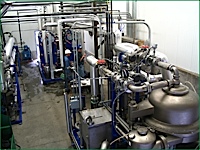GreenShift Corporation has simultaneously announced that it has filed for its third patent on its corn-oil extraction technologies while at the same time, commencing legal action against Big River Resources Galva, Big River Resources West Burlington and Cardinal Ethanol for infringing on GreenShift’s U.S. patent covering its corn oil extraction technology.
The complaint against Big River alleges that they infringed upon GreenShift’s U.S. Patent No. 7,601,858, titled “Method of Processing Ethanol Byproducts and Related Subsystems” (the “858 Patent”). The patent covers processes for recovering corn oil by evaporating and mechanically processing thin stillage, a precursor to the distillers grain co-product of corn ethanol production (“DGS”). Greenshift is claiming that Big River has caused a loss of income and irreparable harm.
Kevin Kreisler, chairman and CEO of GreenShift said in a company statement regarding the lawsuits, “There was no market for corn oil extraction from dry mill ethanol plants before we invented our now-patented technology in 2004. We estimate that more than about 20 percent of the ethanol industry has begun to use our technology without a license. While we are eager to earn the business of each last producer, we expect to have the opportunity to do so by helping each to realize additional value.”
Kreisler continued, “We innovated corn oil extraction technology, created the corn oil extraction market, and subsidized disruptive value creation for the U.S. corn ethanol industry; we have earned our patents and we deserve the full measure of the first mover competitive advantage. This, and any other, continued infringement is causing GreenShift irreparable and immediate harm and it must stop.”
However, ICM has come to the defense of Cardinal Ethanol, as the suit is against ICM equipment. ICM built the ethanol plant that went online in November of 2008.
“ICM will defend its customers as a companion matter to ICM’s own litigation against GS CleanTech and its affiliate, GreenShift Corporation, which we filed in Kansas in October 2009,” said Chris Mitchell, ICM’s vice president of marketing. “ICM believes that GS CleanTech’s alleged patent claims will be proved to be invalid. In the Kansas litigation, we have asserted that GS CleanTech/GreenShift misrepresented the liability of ICM’s customers for operating the ICM system, and that various actions of GS CleanTech/GreenShift constitute unfair competition and wrongful interference with ICM’s existing and prospective business and contractual relationships. Our customers continue to operate their oil recovery systems acquired from ICM, and we continue to see strong interest from prospective customers for further orders for ICM’s equipment.”
And patents they seek. The new patent application will expand its coverage of the company’s technology to “drill” into the backend of corn ethanol plants in order to tap into an existing reserve of inedible crude corn oil that has been historically trapped in the distillers grain co-product of ethanol production.
 According to the company, the corn oil is a valuable second generation feedstock for use in the production of lower carbon fuels such as biodiesel, biojet fuel and renewable diesel. This technology helps an ethanol plant increase profits while reducing greenhouse gas emissions from the production of corn ethanol; however, just how much GHG’s are reduced from corn-ethanol is a point of great contention. GreenShift claims that their portfolio of patented and patent-pending corn oil extraction technologies can increase an ethanol producer’s biofuel yields per bushel of corn by upwards of 7 percent while reducing the energy use and lifecycle GHGs by an estimated 21 percent and 29 percent, respectively.
According to the company, the corn oil is a valuable second generation feedstock for use in the production of lower carbon fuels such as biodiesel, biojet fuel and renewable diesel. This technology helps an ethanol plant increase profits while reducing greenhouse gas emissions from the production of corn ethanol; however, just how much GHG’s are reduced from corn-ethanol is a point of great contention. GreenShift claims that their portfolio of patented and patent-pending corn oil extraction technologies can increase an ethanol producer’s biofuel yields per bushel of corn by upwards of 7 percent while reducing the energy use and lifecycle GHGs by an estimated 21 percent and 29 percent, respectively.
“We are excited to be receiving this third patent as it further strengthens our first mover technology position. While we have many additional applications pending, our issued patents are generally directed to mechanical extraction of oil from concentrated stillage,” concluded David Winsness, GreenShift’s chief technology officer.


